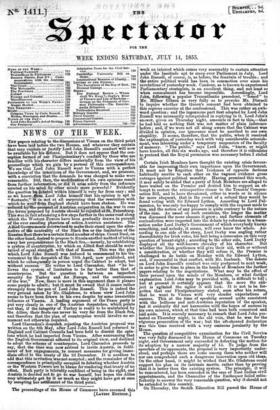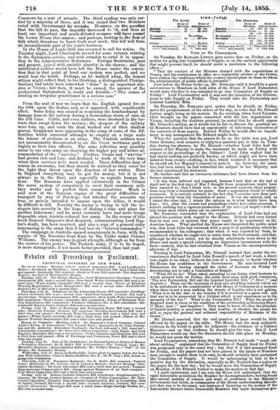The proceedings of the H011813 of Commons have assumed this
week an interest which comes very seasonably to sustain attention under the lassitude apt to creep over Parliament in July. Lord John Russell, of course, is, as before, the fountain of trouble ; and the entire political world has been in commotion ever since his revelations of yesterday week. Candour, as is known to experienced Parliamentary strategists, is an excellent thing, and not least so when concealment has become impossible. Accordingly, Lord John, following a popular Transatlantic precedent, " Teased" to Mr. Milner Gibson so very fully as to provoke Mr. Disraeli to inquire whether the Queen's consent had been obtained to this copious exercise at the confessional. This was rather =awk- ward question; and the ingenuous part first adopted by Lord John. Russell was necessarily relinquished in replying to it. Lord John's answer, given on Thursday night, amounts in fact to this,—that he had told us nothing that was not matter of plain inference before ; and, if we were not all along aware that the Cabinet was divided in opinion, our ignorance must be ascribed to our own stupidity. It seems, therefore, that the public, when it received the explanation of yesterday week with very considerable astonish- ment, was labouring under a temporary suspension of the faculty of memory. " The public," says Lord John, "knew, or might have known, all this six weeks, ago, and therefore it is ridiculous to pretend that the Royal permission was necessary before I stated it.'
Certain Irish Members have thought the existing crisis favour- able for impressing their own importance upon the Government. It must not be forgotten that Irishmen of opposite factions habitually ascribe to each other on the vaguest evidence gross outrages against political morality. Having premised this much, it may safely be added that a party of Irish Members are alleged to have waited on the Premier and desired him to support an at- tempt to restore the retrospective clause to the Tenants' Compen- sation Bill, and to have threatened, either in words or in silence far more eloquent, that in the event of a refusal they would be found voting with Sir Edward Lytton. According to Lord Pal- merston, he was only to happy to comply with the request made to him, and the notion of any pressure is quite contrary to the nature of the case. As usual on such occasions, the longer the matter was discussed the more obscure it grew ; and further elements of contradiction were imported into the debate by reference to a trans- action under Lord Derby's Government of which everybody knows something, and nobody, it seems, will ever know the whole. Ac- cording to one side of the story, Lord Derby was angling rather discreditably for Irish votes, his bait being a concession on this very question of tenant-right ; according to the other side, Lord Derby displayed all the well-known chivalry of his character. But whether the Irish gentlemen will give their aid, with or without a consideration, or whether they will refuse it, the Premier is challenged to do battle on Monday with Sir Edward Lytton, and, if successful in that conflict, with Mr. Roebuck. The debate on Lord John Russell's conduct was only postponed to next week, in order to give time to place in the hands of Members the further papers relating to the negotiations. What may be the effect of their perusal upon the minds of the Members, or what further explanation Lord John may be provided with, is difficult to tell ; but at present it certainly appears that the more the sub- ject is agitated the uglier it will look. It is not to be for• gotten that our Plenipotentiary stated, soon after his return, that he went to Vienna with very slender expectations of success. This at the time of speaking seemed quite consistent with the bellicose and anti-Austrian reputation of the speaker, but it evidently did not harmonize with the hopes of success in his own mission, which at that time had been both conceived and laid aside. It is scarcely necessary to remark that Lord John pro- tested on Thursday night, in the old vein, that he was for the vigorous prosecution of the war ; but the oft-cheered declaration was this time received with a very ominous jocularity by the House.
The question of competitive examination for the Civil Service was very fully discussed in the House of Commons on Tuesday night, and Government only succeeded in defeating the motion for its adoption by a narrow majority of 15. To judge from the speeches of its opponents, the proposal is very imperfectly under- stood, and perhaps there are some among them who neither will nor can comprehend such a dangerous innovation upon old ideas. On the other hand, it might be wished that Mr. Gladstone could support his plan on its intrinsic merits, rather than by proving that it is better than the existing system. The principle, it will be remembered, has been conceded in the case of East Indian civil appointments, and the Chancellor of the Exchequer failed satis- factorily to answer the very reasonable question, why it should not be extended to this country. f On Thursday, the Scotch Education Bill passed the House of
Commons by a sort of miracle. The third reading was only cart Tied by a majority of three, and it was stated that two Members voted with Government By mistake. Renewer, on the question that the bill do pass, the majority increased to 14, and thus at least one important and much-debated measure will .have passed the Lower House this 'session ; and perhaps, looking to the flmv uf talk which threatens to burst forth next week, this bill will form no inconsiderable part of the year's business.
In the House of Lords little has occurred to call for notice. On Tuesday night, Lord Clanricarde moved for some returns relating to the diplomatic service, and took occasion to extol it in opposi- tion to the Administrative Reformers. Foreign Secretaries, past and.present, joined with amiable alacrity in the chorus ; and the ffilinitiated auditor would have left the House under the convic- tion that in that point at least our system was perfect, and we could beat the world. Perhaps, as he walked away, the honest citizen might reflect that, to his thinking, a distinguished Plenipo- tentiary had lately been somewhat " done" in an important mis- sion at Vienna ; but then, it must be owned, the answer of the professional diplomatists is ready and forcible—" This comes of sending an irregular practitioner in a serious case."



























